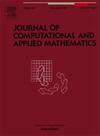Deterministic computation of quantiles in a Lipschitz framework
IF 2.6
2区 数学
Q1 MATHEMATICS, APPLIED
Journal of Computational and Applied Mathematics
Pub Date : 2024-10-25
DOI:10.1016/j.cam.2024.116344
引用次数: 0
Abstract
In this article, we focus on computing the quantiles of a random variable , where is a -valued random variable, , and is a deterministic Lipschitz function. We are particularly interested in scenarios where the cost of a single function evaluation is high, while the law of is assumed to be known. In this context, we propose a deterministic algorithm to compute deterministic lower and upper bounds for the quantile of at a given level . With a fixed budget of function calls, we demonstrate that our algorithm achieves an exponential deterministic convergence rate for ( with ) and a polynomial deterministic convergence rate for () and show the optimality of those rates. Furthermore, we design two algorithms, depending on whether the Lipschitz constant of is known or unknown.
立普齐兹框架下的定量计算
在本文中,我们专注于计算随机变量 f(X) 的量化值,其中 X 是一个 [0,1]d 值随机变量,d∈N∗,f:[0,1]d→R 是一个确定的 Lipschitz 函数。我们尤其感兴趣的是,在假定 X 的规律已知的情况下,单次函数评估的成本很高。在这种情况下,我们提出了一种确定性算法,用于计算给定水平 α∈(0,1)下 f(X) 量值的确定性下限和上限。在 N 次函数调用的固定预算下,我们证明了我们的算法在 d=1 时实现了指数确定性收敛率(O(ρN),ρ∈(0,1)),在 d>1 时实现了多项式确定性收敛率(O(N-1d-1)),并证明了这些收敛率的最优性。此外,我们还根据 f 的 Lipschitz 常数是已知还是未知,设计了两种算法。
本文章由计算机程序翻译,如有差异,请以英文原文为准。
求助全文
约1分钟内获得全文
求助全文
来源期刊
CiteScore
5.40
自引率
4.20%
发文量
437
审稿时长
3.0 months
期刊介绍:
The Journal of Computational and Applied Mathematics publishes original papers of high scientific value in all areas of computational and applied mathematics. The main interest of the Journal is in papers that describe and analyze new computational techniques for solving scientific or engineering problems. Also the improved analysis, including the effectiveness and applicability, of existing methods and algorithms is of importance. The computational efficiency (e.g. the convergence, stability, accuracy, ...) should be proved and illustrated by nontrivial numerical examples. Papers describing only variants of existing methods, without adding significant new computational properties are not of interest.
The audience consists of: applied mathematicians, numerical analysts, computational scientists and engineers.

 求助内容:
求助内容: 应助结果提醒方式:
应助结果提醒方式:


